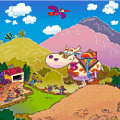162 - La vaca estudiosa
|cow|studious
162 - Die fleißige Kuh
162 - The studious cow
162 - La mucca studiosa
162 - 勉強熱心な牛
162 - Studijuojanti karvė
162 - De leergierige koe
162 - Pilna krowa
162 - Студійна корова
162 - 好學的牛
NARRADOR
Había una vez una vaca en la Quebrada de Humahuaca.
|||||||ravine||Humahuaca
Once upon a time there was a cow in the Quebrada de Humahuaca.
NIÑO
¡Buenos días, señora vaquita!
|||cow
Good morning, lady vaquita!
VACA
COW
COW
No señor, de aquí nadie me quita.
No||||||takes away
No sir, nobody takes me away from here.
NARRADOR
Como era muy vieja, muy vieja, estaba sorda de una oreja.
||||very|||deaf|||ear
As she was very old, very old, she was deaf in one ear.
NARRADOR
Y a pesar de que ya era abuela un día quiso ir a la escuela.
|||||||grandmother|||she wanted||||
And even though she was already a grandmother, one day she wanted to go to school.
NARRADOR
Se puso unos zapatos rojos, guantes de tul y un par de anteojos.
She|put on|||||of|tulle|and|a|||glasses
He put on red shoes, tulle gloves, and a pair of glasses.
La vio la maestra asustada y dijo:
The||||||
Die verängstigte Lehrerin sah sie und sagte:
The teacher saw her scared and said:
MAESTRA
Estas equivocada.
|wrong
Sie irren sich.
You're wrong.
NARRADOR
Y la vaca le respondió:
And the cow answered him:
VACA
¿Por qué no puedo estudiar yo?
Why can't I study?
NARRADOR
La vaca, vestida de blanco, se acomodó en el primer banco.
The cow, dressed in white, settled on the first bench.
EFECTO BURLAS NIÑAS Y NIÑOS
|mockery|||
TEASING EFFECT GIRLS AND BOYS
NIÑA
Los chicos tirábamos tiza y nos moríamos de risa.
||we used to throw|chalk|||we would die||
Die Jungen warfen Kreide und wir lachten vor Lachen.
We boys threw chalk and we laughed.
Nous, les garçons, avons jeté de la craie et nous avons ri.
NIÑO
La gente se fue muy curiosa a ver a la vaca estudiosa.
People went very curious to see the studious cow.
NIÑA
La gente llegaba en camiones, en bicicletas y en aviones.
||||||bicycles|||
People came in trucks, bicycles, and airplanes.
NIÑO
Y como el bochinche aumentaba en la escuela nadie estudiaba.
|||gossip||||||
And since the hubbub increased in school, no one studied.
VACA
Dos por una dos Dos por dos cuatro
Two for one two Two for two four
NARRADOR
La vaca, de pie en un rincón, rumiaba sola la lección.
||||||corner|was chewing|||
Die Kuh, die in einer Ecke stand, überlegte die Stunde allein.
The cow, standing in a corner, ruminated alone on the lesson.
NARRADOR
Un día toditos los chicos se convirtieron en borricos.
||||||became||donkeys
One day all the boys turned into donkeys.
Y en ese lugar de Humahuaca la única sabia fue la vaca.
And in that place in Humahuaca the only wise man was the cow.

